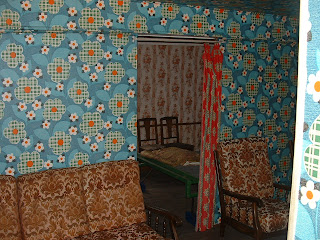The shutter is a marvellous asset for many reasons. Firstly and primarily, they offer protection from the intense heat of the summer sun. When it is really hot here, the trick is to leave all windows and shutters firmly closed when the sun is on them and then open everything up once the sun disappears for the day. In this way, the stone houses can be kept bearably cool. Equally, closed shutters are good protection from the worst of the winter weather, as they create a sort of primitive double glazing effect. Another benefit is that you can have windows open and shutters closed as a way of letting in air yet keeping out rain or light. They protect not only the inhabitants but also the windows themselves from the harshness of both summer and winter weather: I see all the time ancient houses with the original oak windows still in place and still sound and solid.
Then, there is the security benefit. I can't say this has ever bothered me personally, as I live in a very low-crime area, but the French have a peculiar obsession with burglary and most insurance policies require shutters to at least all ground floor windows and doors. For a holiday home which will be left empty for long periods, it's comforting to be able to close the place up completely. Indeed, when French people view a house, they are always most put out if there are no shutters.
Where there are shutters, there have to be inward-opening windows, which makes much more sense, as they can all be easily accessed for cleaning. This arrangement also allows them to be hung on lift-off hinges, so if they need painting or if you ever have to replace a pane, you simply take the whole thing off and carry it out to the garage (or off to the glass-cutter) for the necessary work.
 There is one final advantage which is particularly useful in my line of work. Around here, most of the little villages have no need of anything so fancy as street names. Postal workers use owners' names as reference. Houses may or may not be numbered, but even if they are, the sequence of the numbers is usually totally random and many owners struggle to remember their number, as it has no practical use. This means that finding a particular house in a village can be tricky: I am aften to be found driving at snail's pace around a hamlet, waiting for my new vendor to leap out and identify himself. The one question one always asks when taking down directions is "And what colour are your shutters?"
There is one final advantage which is particularly useful in my line of work. Around here, most of the little villages have no need of anything so fancy as street names. Postal workers use owners' names as reference. Houses may or may not be numbered, but even if they are, the sequence of the numbers is usually totally random and many owners struggle to remember their number, as it has no practical use. This means that finding a particular house in a village can be tricky: I am aften to be found driving at snail's pace around a hamlet, waiting for my new vendor to leap out and identify himself. The one question one always asks when taking down directions is "And what colour are your shutters?" 










